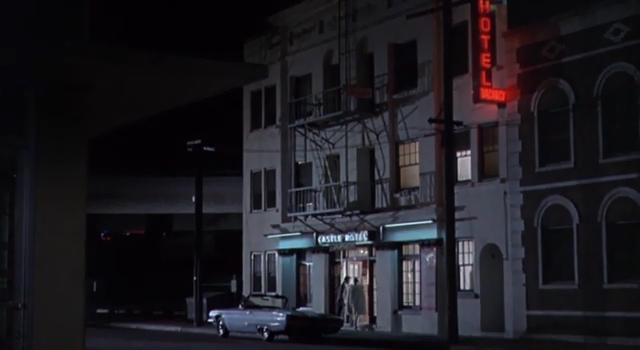I Dream of Genie
The Twilight Zone
The greatest joke
ever on television.
An American Dream

“That
everything will come out all right in the end.” The
lay of the land, or the apple cart. You and she and
Uncle Ganucci make three. Thirty stories from
red-light penthouse to well-traveled pavement (cf. Dmytryk’s Murder,
My Sweet). A fine Hitchcockian point of murder or something else from I Confess and North by Northwest.
The Korean War
Medal of Honor recipient and the chanteuse at Club Penguin (“Hal Ortega,
‘Vibes In Tempo’”). A Los Angeles
rooftop at freeway level remembered in Tom O’Horgan’s
film of Ionesco’s Rhinoceros, “right in the middle of the jungle.” Great intimate views of the city, just ahead of
Altman’s Countdown.
The Citizen Kane motif from Welles (cf. Fritz Lang’s While the City Sleeps). Characteristic
Mailer dialogue (screenplay Mann Rubin, cinematography Sam Leavitt, score
Johnny Mandel, who wagers “A Time for Loving” with lyrics by Paul
Francis Webster) and a line of rapid-fire patter in good working order. A major line of analysis from Hitchcock’s Rebecca. The avenging conscience, as
Griffith would say, also from Lang (Scarlet
Street). A deal in the millions, “top of the ratings.”
Rossen’s The Hustler a notable
influence.
One of William Conrad’s
masterworks as producer, cp. Brainstorm
(which like Two on a Guillotine and My Blood Runs Cold he furthermore
directed, screenplay Mann Rubin, cinematography Sam Leavitt, score George Duning). The highly
intricate, variegated and detailed structure still winnows out to one on the
order of Mailer’s Tough Guys
Don’t Dance. The occult cinematic form is again from Lang (or Losey),
the middle ground of M (but cf. Huston’s Under the Volcano, “when the announcement was made that
Norman Mailer’s An American Dream
was to be made into a movie,” said Pauline Kael
in The New Republic, “my
reaction was that John Huston was the only man who could do it”). Janet Leigh’s platinum coif and makeup suggest
rather an identification with Becker’s Casque d’Or, death of a soldier in plain
sight (down the staircase she departs, an image in late Nabokov).
Andrew Sarris (The American Cinema), “hilarious
misalliance of Mailer and Hollywood.”
TV Guide,
“deteriorates into a cynical look at 1960s society.”
Geoff Andrew (Time Out),
“a long haul.” Film4,
“suffers
from a lack of punch, depth and cohesion.” Catholic News Service Media Review Office, “generally
inept” and “morally offensive”. Halliwell’s Film Guide,
“ludicrously heavy-handed”.
The System
Mission: Impossible
A witness is
needed to testify against the mob’s “boss contractor”,
who’s just killed one.
Three approaches
are taken to turning his casino manager. Phelps introduces the idea that a hit
man (Willy) is on his way to silence the traitor, Barney and Rollin intercept
calls to the boss. An expensive mistress is provided in the form of Cinnamon,
with checks forged by Rollin. Finally, the crowning touch, Barney plays St.
Nicholas by reaching all the way across the counting-room floor and its alarm
to place a pile of extra money in the vault with Ben Franklin’s Long Arm,
so that Rollin as the new accountant can tally up the take and find it
under-reported.
With his entire
operation upended and in revolt, the manager locks himself in the
counting-room, hits the alarm and waits for the police.
Gist’s
clarity of direction makes use of a micro-camera to give a view of craps and
blackjack from the surface of the table.
The Singapore File
Hawaii Five-O
The elimination
of a witness to a murder committed by the top boss of island crime is
temporarily averted when the witness flees to Singapore rather than testify. An
attempt is made there, she calls McGarrett.
The Singapore
police have been bought into, McGarrett and the girl take a freighter to the
Philippines. The kingpin offers an open contract with a bonus if both are hit.
One independent operator receives a telegram aboard ship, McGarrett in the
radio shack deciphers the keyed reception.
The girl has
lived as a prostitute in Singapore, they share a cabin with two bunk beds. The
few passengers on the freighter include a minister who is the hit man, and a
middle-aged husband whose wife issues a gentle warning to “Mr. Collins”.
From Rain
(dir. Lewis Milestone) or Miss Sadie Thompson (dir. Curtis Bernhardt) to
their source in the adulteress and her proper ministration.